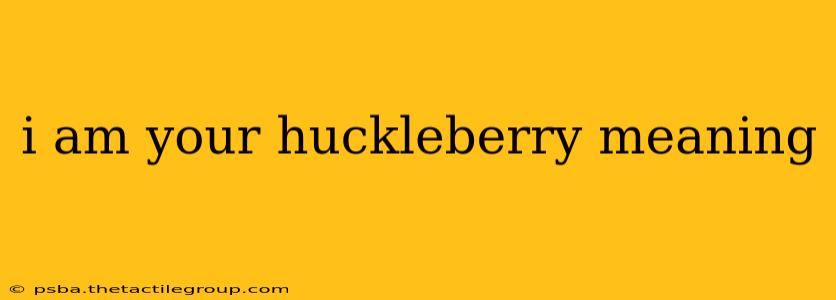The phrase "I'm your huckleberry" is a classic piece of American vernacular, instantly recognizable to fans of Western films and literature. But what does it actually mean, and where did it come from? This isn't just a quirky expression; it carries a weight of meaning that speaks to readiness, capability, and a certain self-assured confidence.
The Origin: More Than Just a Berry
Unlike many idioms, pinpointing the precise origin of "I'm your huckleberry" is surprisingly difficult. It's not found in early dictionaries or readily traceable to a specific historical event. However, the most widely accepted theory links the phrase to the iconic character of Doc Holliday in the American West.
While not explicitly stated in historical accounts of Doc Holliday, the phrase's association with him is firmly entrenched in popular culture, largely thanks to its memorable use in the 1993 film Tombstone. In the film, Holliday uses the line to indicate his willingness to take on a challenge, showcasing his readiness for a duel. This cinematic portrayal solidified the phrase's meaning in the public consciousness.
Deconstructing the Meaning: Beyond the Duel
The meaning of "I'm your huckleberry" isn't strictly limited to accepting a duel. While the context of Tombstone lends itself to a sense of confrontation and willingness to fight, the broader interpretation is more nuanced.
Here's a breakdown of the connotations:
-
Readiness and Capability: The phrase implies that the speaker is the perfect person for the job, challenge, or task at hand. They are equipped with the necessary skills and are prepared to meet the demands.
-
Confidence and Assurance: There's a distinct air of self-assurance in the phrase. It's not simply a statement of competence; it's a bold declaration of suitability, suggesting a level of expertise that surpasses others.
-
Acceptance of a Challenge: While not always about a physical confrontation, the phrase hints at a willingness to take on something difficult or demanding. It signals a proactive and assertive attitude.
-
A Touch of Southern Charm (and Mystery): The phrasing itself is subtly evocative, retaining a hint of the old American South. The unusual choice of "huckleberry" adds a layer of intrigue and makes the phrase stand out.
How to Use "I'm Your Huckleberry"
Understanding the nuances of "I'm your huckleberry" allows you to use it effectively in various contexts. It works best when:
- You're confident in your abilities: Don't use it unless you genuinely feel capable of handling the situation.
- The situation requires a specific skillset: The phrase works well when you possess unique expertise relevant to the challenge.
- You want to express your willingness to engage: It indicates a proactive approach and an acceptance of responsibility.
Examples:
- "Need someone to debug this complex code? I'm your huckleberry."
- "They're looking for a negotiator who can handle this delicate situation? I'm your huckleberry."
- "Looking for someone to lead the team through this difficult project? I'm your huckleberry."
Conclusion: A Phrase for the Ages
"I'm your huckleberry" is more than just a quirky expression; it's a testament to American culture and the enduring appeal of classic Western imagery. Its meaning is rich and multifaceted, encapsulating readiness, self-assurance, and a willingness to face challenges head-on. So, the next time you find yourself perfectly suited to a task, remember this unique phrase and let it express your confidence and capability with a touch of old-fashioned charm.

